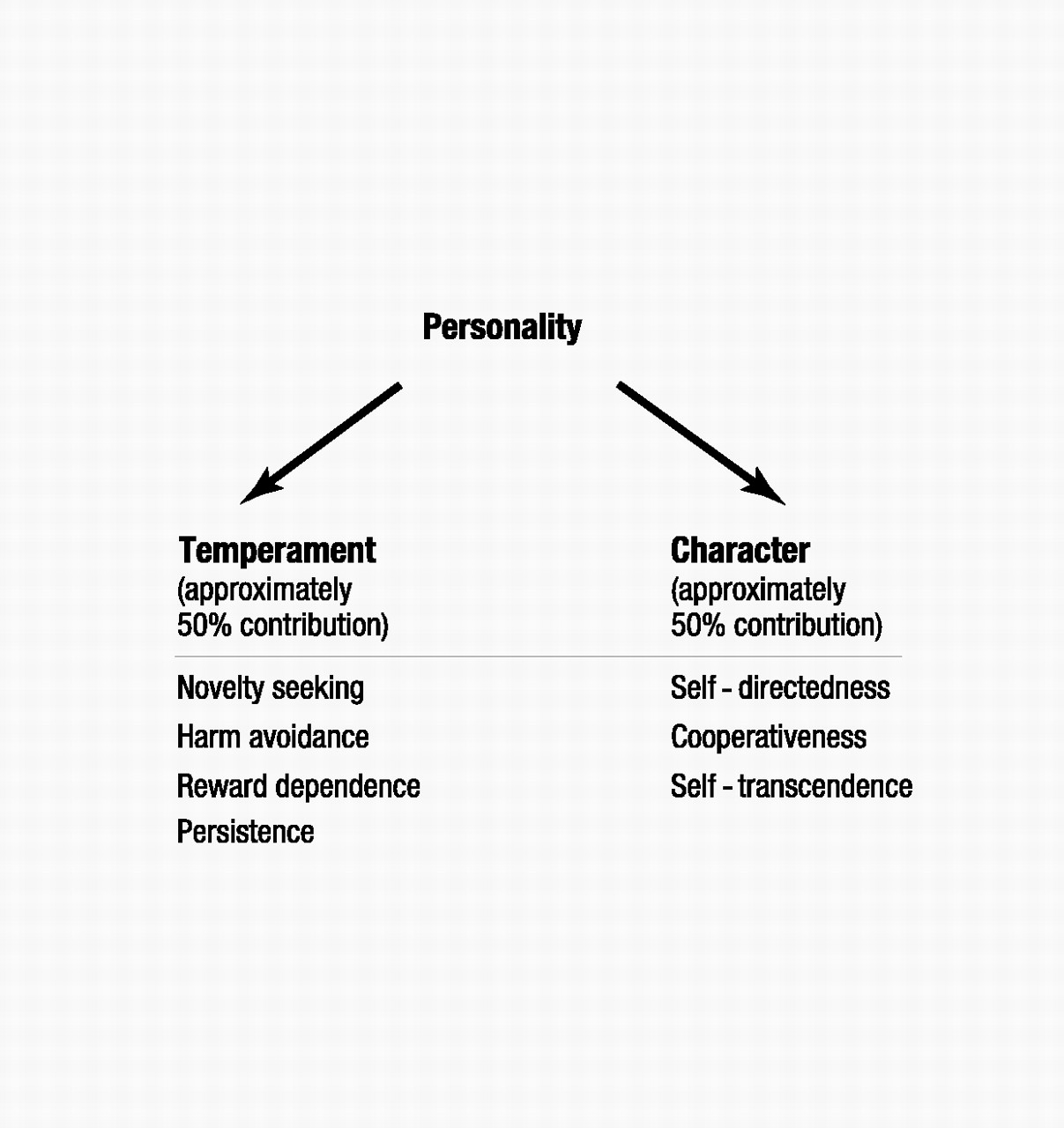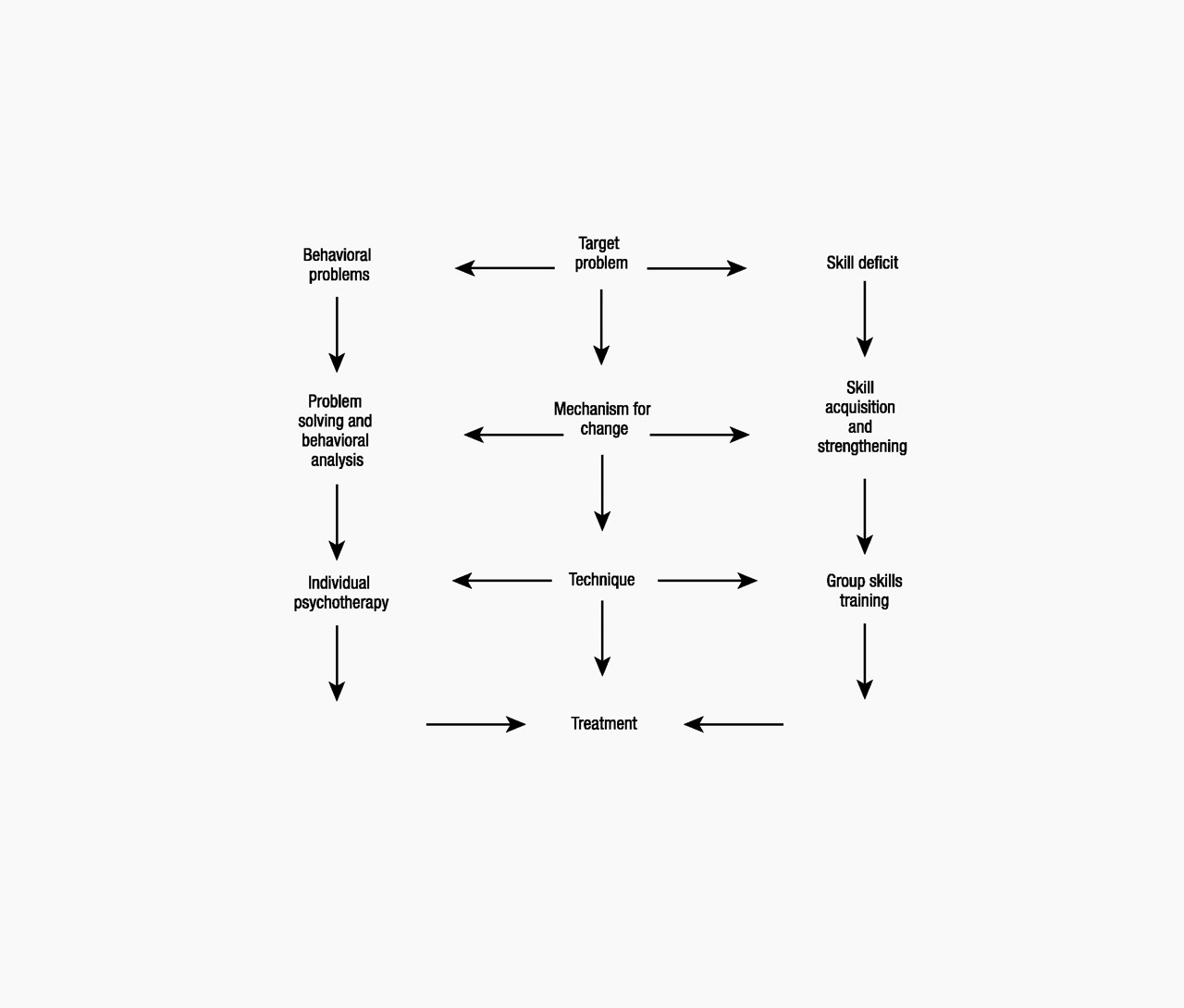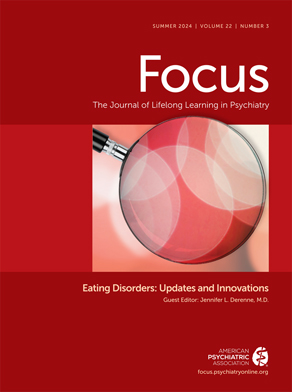Quick Reference for Personality Disorders
| Poor Prognosis | Good Prognosis |
|---|---|
| Parental brutality/incest (Stone 1990) | High IQ (McGlashan 1985; Stone 1990) |
| Greater affective instability (McGlashan 1992) | Absence of narcissistic entitlement (Plakun 1991) |
| Magical thinking (McGlashan 1992) | Absence of parental divorce (Plakun 1991) |
| Impulsivity and substance abuse (Links et al. 1993) | |
| Comorbid schizotypal, antisocial, or paranoid features (Links et al. 1998; McGlashan 1986; Stone 1993) | |
| Presence of maternal psychopathology (Paris et al. 1988) | |
| Family history of mental illness (Paris et al. 1988) |
Note: Reference list is at the end of this section.
Source: Gabbard GO: Psychodynamic Psychiatry in Clinical Practice, 4th ed. Washington, DC, American Psychiatric Publishing, 2005, p 434
| Affective-Dysregulation | Impulsive-Behavioral | Cognitive-Perceptual |
|---|---|---|
| SSRI | SSRI | Low-dose antipsychotic |
| Low-dose antipsychotic | Low-dose antipsychotic | SSRI |
| Clonazepama | Lithium carbonate | |
| MAOIb | MAOIb | |
| Lithium | Carbamazepine | |
| Divalproex | ||
| Naltrexonec |
MAOI=monoamine oxidase inhibitor; SSRI=selective serotonin reuptake inhibitor
a Do not use alprazolam, as it may result in disinhibition.
b MAOIs should be used with considerable caution because of dietary restrictions.
c If self-mutilation and/or alcohol abuse is present.
Source: Gabbard GO: Psychodynamic Psychiatry in Clinical Practice, 4th ed. Washington, DC, American Psychiatric Publishing, 2005, p 447 (based on Gabbard 2000 and Soloff 1998)

| Need for admiration and affirmation from the therapist |
| Idealization of the therapist |
| Assumption of twinship between therapist and patient |
| Proneness to feel shamed and humiliated by the therapist |
| Contempt and devaluation toward the therapist, often related to envy |
| Denial of the therapist’s autonomy |
| Omnipotent control of the therapist |
| Insistence on exclusive dyadic relatedness that does not allow for a third party |
| Use of the therapist as a sounding board without empathy for the therapist’s experience |
| Denial of dependency on the therapist |
| Inability to accept help from the therapist |
Source: Gabbard GO: Psychodynamic Psychiatry in Clinical Practice, 4th ed. Washington, DC, American Psychiatric Publishing, 2005, p 503
| Cluster | Type | Characteristic Features |
|---|---|---|
| A | Odd or eccentric | |
| Paranoid | Pervasive distrust and suspiciousness of others such that their motives are interpreted as malevolent | |
| Schizoid | Pervasive pattern of detachment from social relationships and restricted range of expression of emotions in interpersonal settings | |
| Schizotypal | Pervasive pattern of social and interpersonal deficits marked by acute discomfort with, and reduced capacity for, close relationships as well as by cognitive or perceptual distortions and eccentricities of behavior | |
| B | Dramatic, emotional, or erratic | |
| Antisocial | History of conduct disorder before age 15; pervasive pattern of disregard for and violation of the rights of others; current age at least 18 | |
| Borderline | Pervasive pattern of instability of interpersonal relationships, self-image, and affects, and marked impulsivity | |
| Histrionic | Pervasive pattern of excessive emotionality and attention seeking | |
| Narcissistic | Pervasive pattern of grandiosity (in fantasy or behavior), need for admiration, and lack of empathy | |
| C | Anxious or fearful | |
| Avoidant | Pervasive pattern of social inhibition, feelings of inadequacy, and hypersensitivity to negative evaluation | |
| Dependent | Pervasive and excessive need to be taken care of that leads to submissive and clinging behavior and fears of separation | |
| Obsessive-compulsive | Pervasive pattern of preoccupation with orderliness, perfectionism, and mental and interpersonal control at the expense of flexibility, openness, and efficiency |
Source: Skodol AE: Manifestations, clinical diagnosis, and comorbidity, in The American Psychiatric Publishing Textbook of Personality Disorders. Edited by Oldham JO, Skodol AE, Bender DS. Washington, DC, American Psychiatric Publishing, 2005, chapter 4, p 60 (adapted from DSM-IV-TR, p 685)
| I. | Mindfulness |
A. Focusing on the moment B. Awareness without judgment | |
| II. | Distress tolerance |
A. Crisis survival strategies B. Radical acceptance of reality | |
| III. | Emotion regulation |
A. Observe and identify emotional states B. Validate and accept one’s emotions C. Decrease vulnerability to negative emotions D. Increase experience of positive emotions | |
| IV. | Interpersonal effectiveness |
A. Assertiveness training B. Cognitive restructuring C. Balancing objectives with maintaining relationships and self-esteem |
Source: Stanley B, Brodsky BS: Dialectical behavior therapy, in The American Psychiatric Publishing Textbook of Personality Disorders. Edited by Oldham JO, Skodol AE, Bender DS. Washington, DC, American Psychiatric Publishing, 2005, chapter 19, p 312

References
Information & Authors
Information
Published In
History
Authors
Metrics & Citations
Metrics
Citations
Export Citations
If you have the appropriate software installed, you can download article citation data to the citation manager of your choice. Simply select your manager software from the list below and click Download.
For more information or tips please see 'Downloading to a citation manager' in the Help menu.
There are no citations for this item
View Options
View options
PDF/ePub
View PDF/ePubGet Access
Login options
Already a subscriber? Access your subscription through your login credentials or your institution for full access to this article.
Personal login Institutional Login Open Athens loginNot a subscriber?
PsychiatryOnline subscription options offer access to the DSM-5-TR® library, books, journals, CME, and patient resources. This all-in-one virtual library provides psychiatrists and mental health professionals with key resources for diagnosis, treatment, research, and professional development.
Need more help? PsychiatryOnline Customer Service may be reached by emailing [email protected] or by calling 800-368-5777 (in the U.S.) or 703-907-7322 (outside the U.S.).

